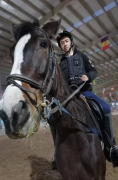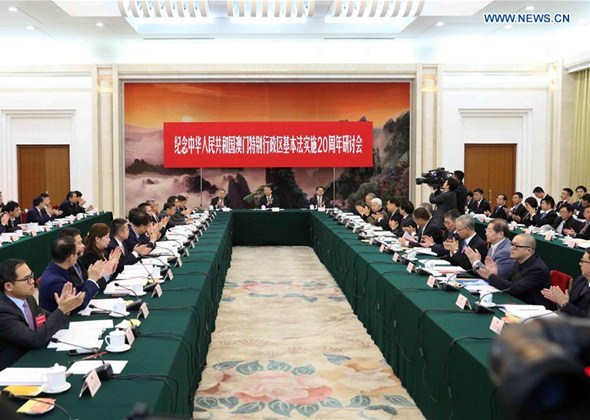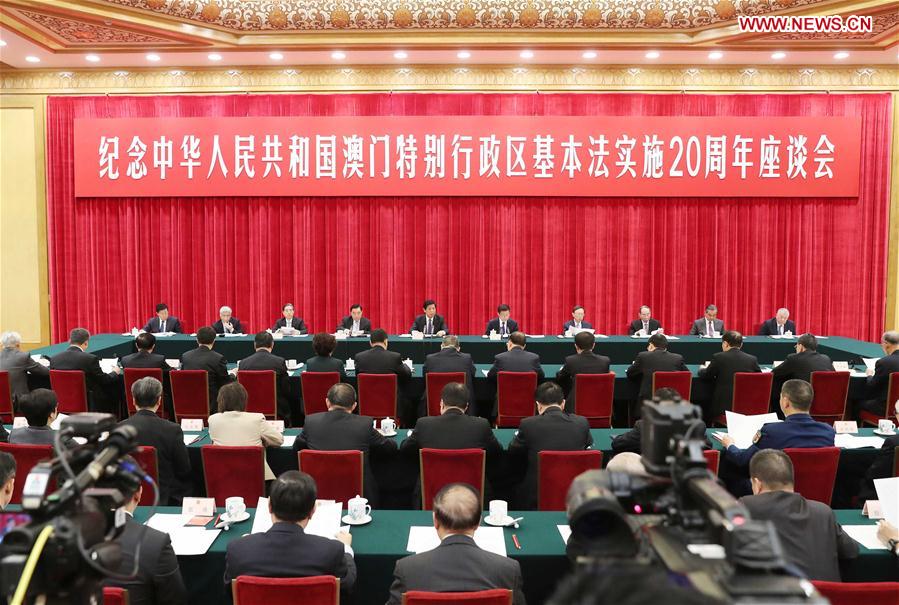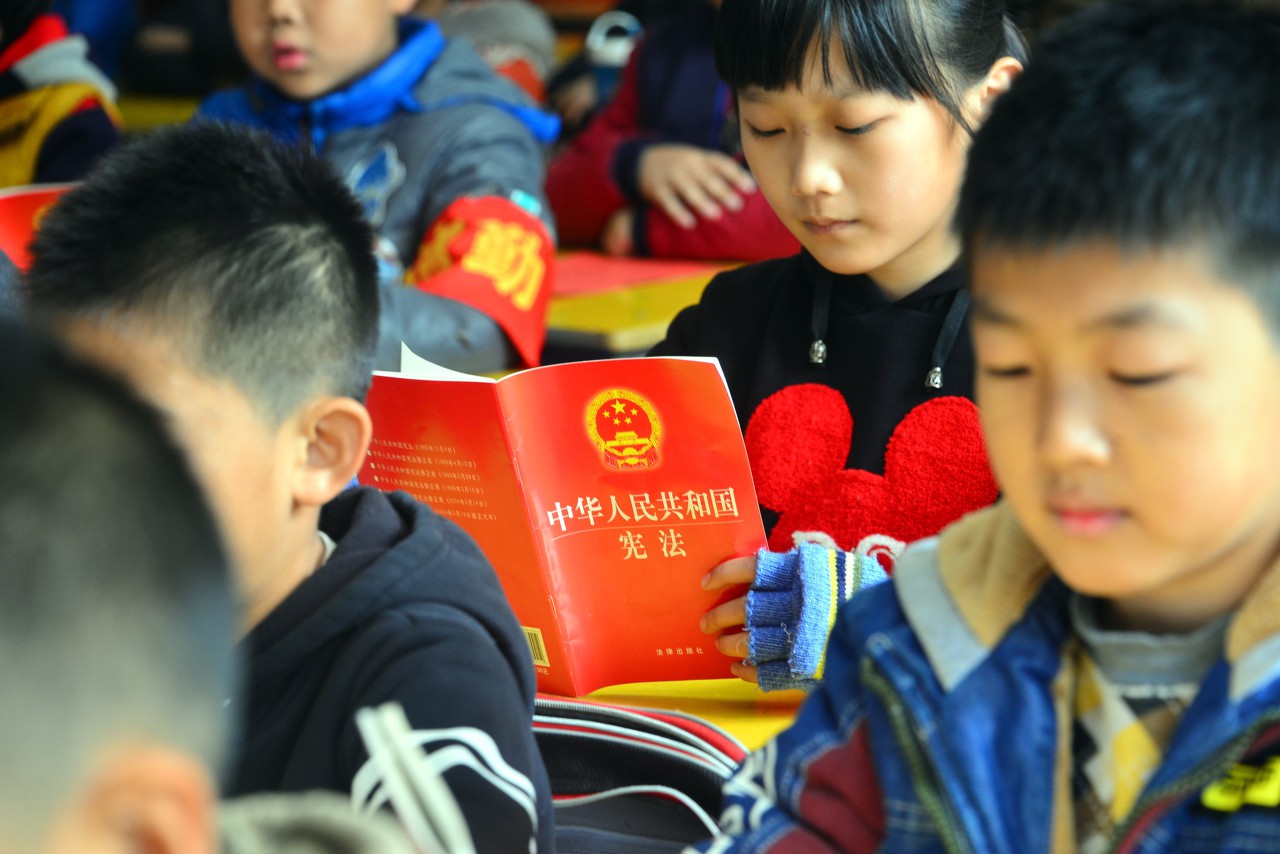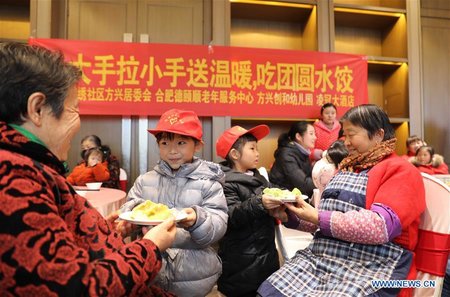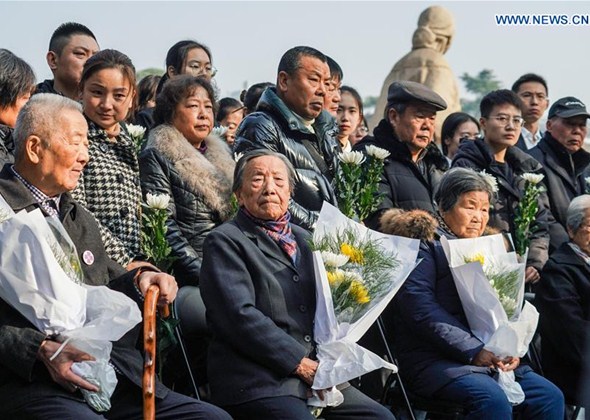Family Commemoration Activities for Nanjing Massacre Victims
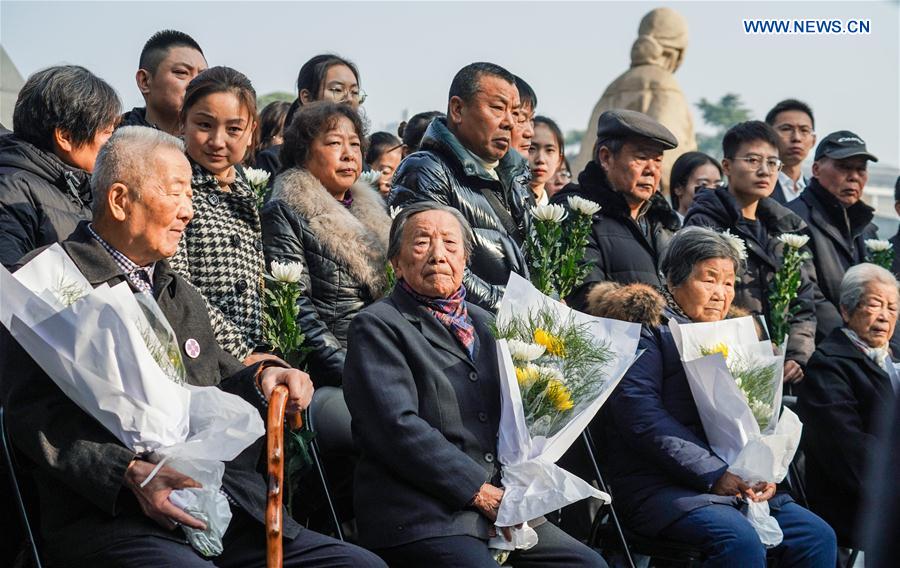
Survivors of the Nanjing Massacre Ge Daorong (1st L, front), Xia Shuqin (2nd L, front), Ai Yiying (1st R, front), and Tao Xiuhua (2nd R, front), the daughter of the newly confirmed victim Zhou Wanrong attend commemoration activities for the victims in Nanjing Massacre by Japanese invaders in Nanjing, capital of east China's Jiangsu Province, December 3, 2019. Starting Tuesday, family members of the victims of the massacre began a series of commemoration activities such as laying flowers and burning incense before the memorial wall where the victims' names are engraved. The Nanjing Massacre took place when Japanese troops captured the city, then China's capital, on December 13, 1937. Over six weeks, they killed 300,000 Chinese civilians and unarmed soldiers. In February 2014, China's top legislature designated December 13 as the national memorial day for victims of the Nanjing Massacre. Family members of the victims also started to hold commemoration activities at the memorial hall in December of the same year. [Xinhua/Li Bo]
NANJING, December 3 (Xinhua) — Standing in front of the Memorial Hall of the Victims in Nanjing Massacre by Japanese Invaders, Tao Xiuhua expressed her thoughts to her father, Zhou Wanrong, who was killed in the atrocity.
"Dear Dad, your three grandchildren are here to see you. Our life is good today. Wish you were still with us." Tao said at the memorial hall in Nanjing, capital of east China's Jiangsu Province.
Starting Tuesday, family members of the victims of the massacre began a series of commemoration activities such as laying flowers and burning incense before the memorial wall where the victims' names are engraved.
Zhou Wanrong's name was engraved on the wall on November 29, which became the 10,665th name on the wall.
Tao said that she and her then five-year-old younger sister witnessed that their father and several other Chinese were taken away by Japanese soldiers on December 14, 1937. They never came back.
Wei Dongmei, the granddaughter of another victim called Wei Shaomin, touched his name engraved on the wall. "Grandpa, I'm here to see you," she said.
Wei Shaomin was taken away by Japanese troops not far from his home and then killed by seven gunshots on December 13, 1937. Only two of his seven children were known today. All the others either died or were given away to other families.
"History should not be forgotten. It must be respected. Peace and happiness should not be desecrated," she said. "I hope that everyone can spread the seeds of peace and happiness to every corner of the world."
The Nanjing Massacre took place when Japanese troops captured the city, then China's capital, on December 13, 1937. Over six weeks, they killed 300,000 Chinese civilians and unarmed soldiers.
In February 2014, China's top legislature designated December 13 as the national memorial day for victims of the Nanjing Massacre. Family members of the victims also started to hold commemoration activities at the memorial hall in December of the same year.
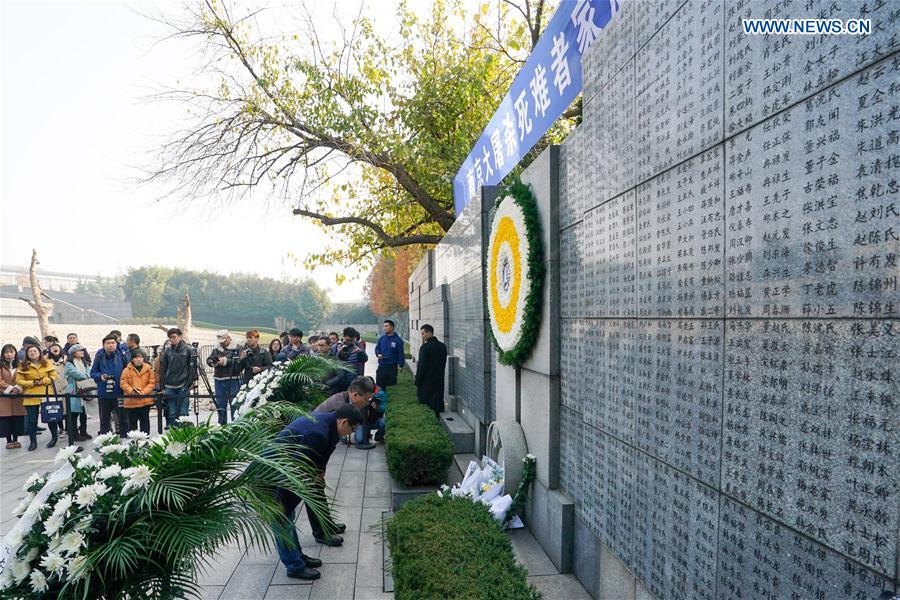
People attend commemoration activities for the victims in Nanjing Massacre by Japanese invaders in Nanjing, capital of east China's Jiangsu Province, December 3, 2019. Starting Tuesday, family members of the victims of the massacre began a series of commemoration activities such as laying flowers and burning incense before the memorial wall where the victims' names are engraved. The Nanjing Massacre took place when Japanese troops captured the city, then China's capital, on December 13, 1937. Over six weeks, they killed 300,000 Chinese civilians and unarmed soldiers. In February 2014, China's top legislature designated December 13 as the national memorial day for victims of the Nanjing Massacre. Family members of the victims also started to hold commemoration activities at the memorial hall in December of the same year. [Xinhua/Li Bo]
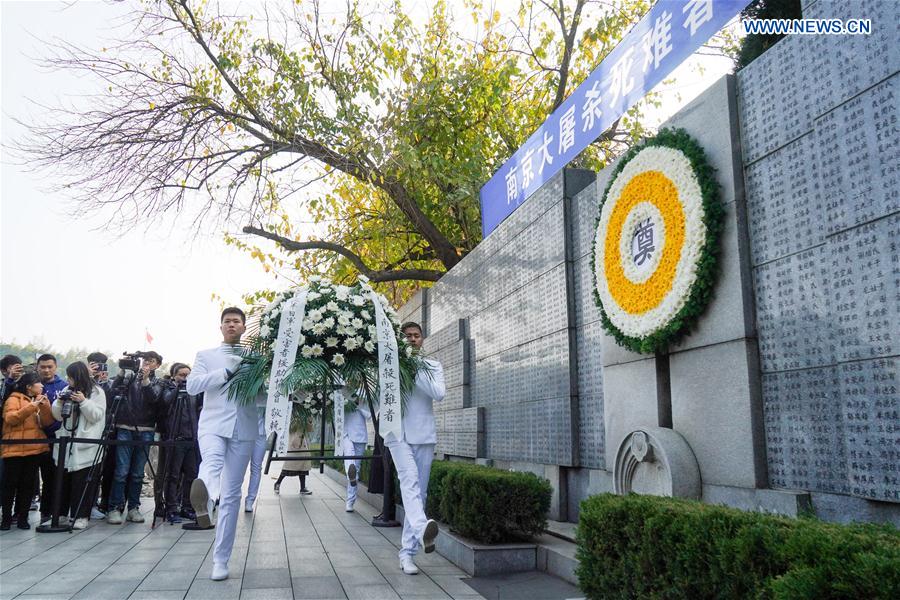
People attend commemoration activities for the victims in Nanjing Massacre by Japanese invaders in Nanjing, capital of east China's Jiangsu Province, December 3, 2019. Starting Tuesday, family members of the victims of the massacre began a series of commemoration activities such as laying flowers and burning incense before the memorial wall where the victims' names are engraved. The Nanjing Massacre took place when Japanese troops captured the city, then China's capital, on December 13, 1937. Over six weeks, they killed 300,000 Chinese civilians and unarmed soldiers. In February 2014, China's top legislature designated December 13 as the national memorial day for victims of the Nanjing Massacre. Family members of the victims also started to hold commemoration activities at the memorial hall in December of the same year. [Xinhua/Li Bo]
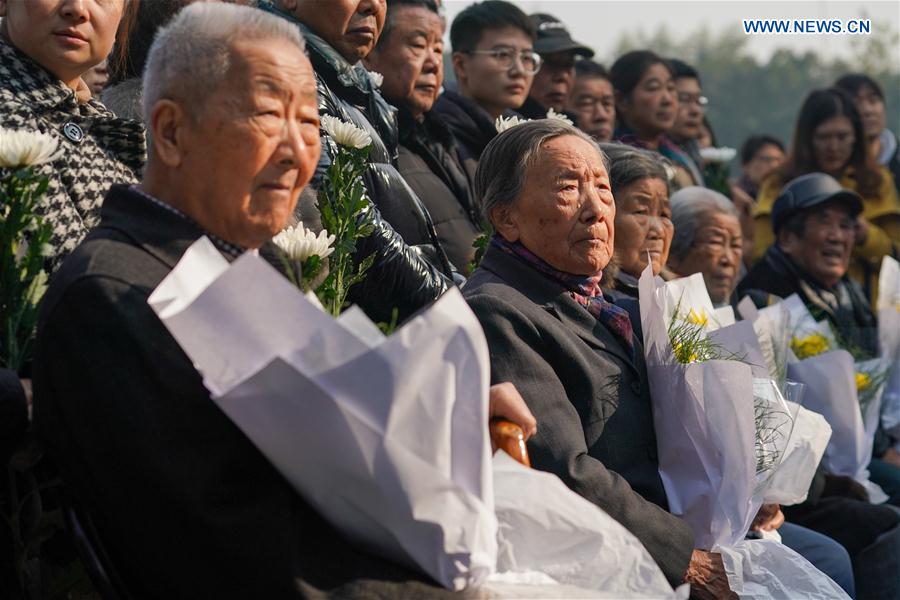
Survivors of the Nanjing Massacre Ge Daorong(1st L, front), Xia Shuqin (2nd L, front), Ai Yiying (2nd R, front), Ma Tingbao (1st, R), and Tao Xiuhua (3rd, L, front), the daughter of the newly confirmed victim Zhou Wanrong attend commemoration activities for the victims in Nanjing Massacre by Japanese invaders in Nanjing, capital of east China's Jiangsu Province, December 3, 2019. Starting Tuesday, family members of the victims of the massacre began a series of commemoration activities such as laying flowers and burning incense before the memorial wall where the victims' names are engraved. The Nanjing Massacre took place when Japanese troops captured the city, then China's capital, on December 13, 1937. Over six weeks, they killed 300,000 Chinese civilians and unarmed soldiers. In February 2014, China's top legislature designated December 13 as the national memorial day for victims of the Nanjing Massacre. Family members of the victims also started to hold commemoration activities at the memorial hall in December of the same year. [Xinhua/Li Bo]
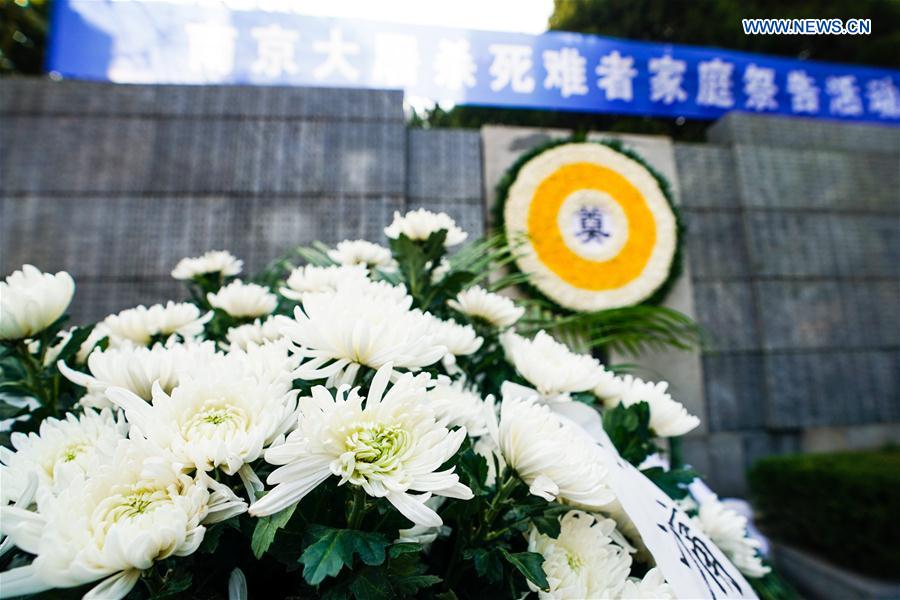
Photo taken on December 3, 2019 shows flowers laid before the memorial hall wall where the victims' names are engraved during a commemoration activity in Nanjing, capital of east China's Jiangsu Province. Starting Tuesday, family members of the victims of the massacre began a series of commemoration activities such as laying flowers and burning incense before the memorial wall where the victims' names are engraved. The Nanjing Massacre took place when Japanese troops captured the city, then China's capital, on December 13, 1937. Over six weeks, they killed 300,000 Chinese civilians and unarmed soldiers. In February 2014, China's top legislature designated December 13 as the national memorial day for victims of the Nanjing Massacre. Family members of the victims also started to hold commemoration activities at the memorial hall in December of the same year. [Xinhua/Li Bo]
(Source: Xinhua)









